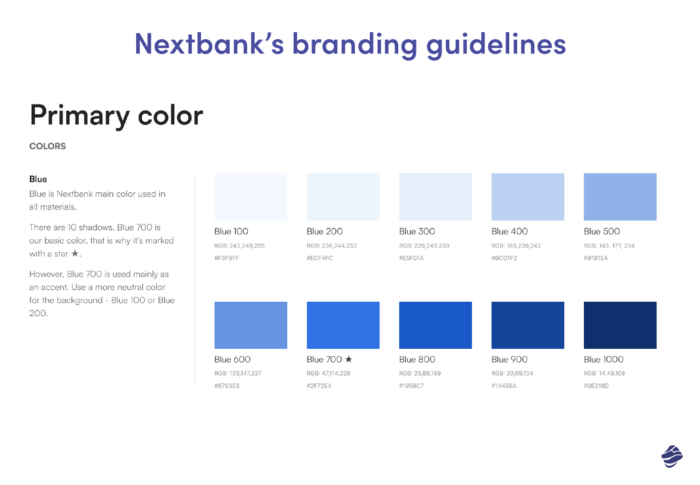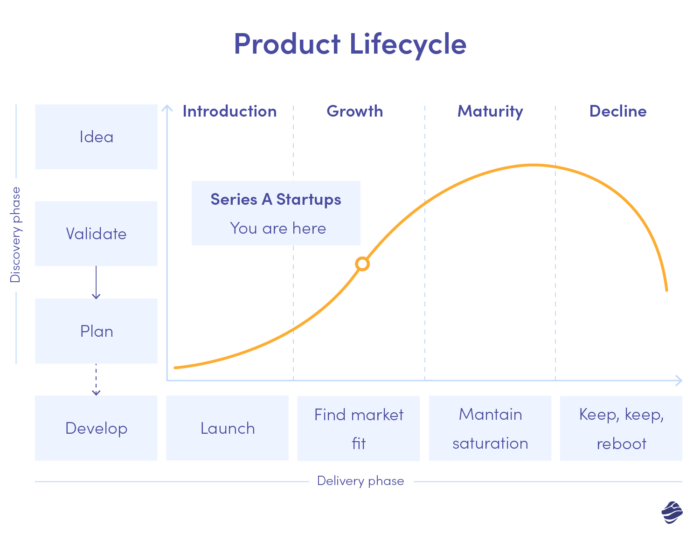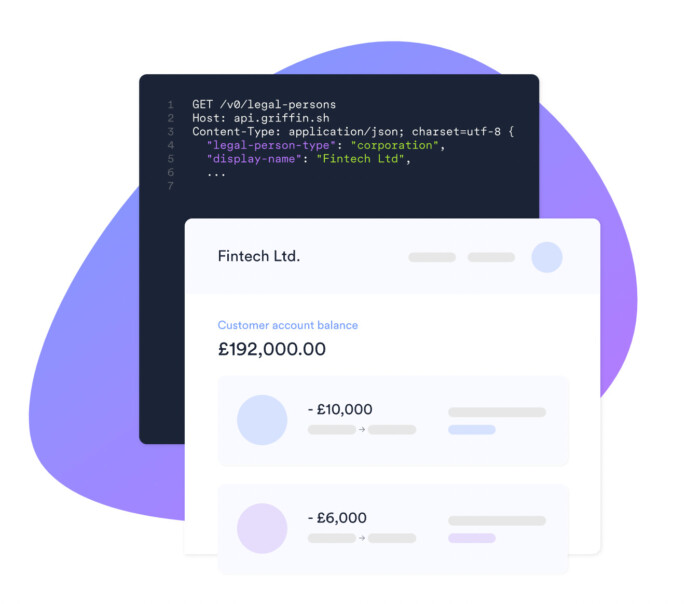In the dynamic world of startups, success often begins with a groundbreaking business idea, market vision, and the determination to turn it into a reality. From those early stages of humble beginnings, where founders usually rely on the support of friends, family, and their own financial resources, a startup can gradually gain traction and start to make a mark in the market. As the product succeeds and its customer base grows, so do its ambitions, measurable goals, and the need to expand operations.
The journey of a Series A startup is marked by significant milestones, including attracting investors (and new customers!), unlocking growth opportunities and achieving market success.
In this phase of the product development lifecycle, it is crucial to establish a strategy for creating a business framework that can generate sustainable profits over the long term. Frequently, early-stage startups possess brilliant ideas that attract a significant number of enthusiastic users, yet they lack a clear strategy for how to generate revenue from their business.
One crucial element that can significantly enhance a Series A startup’s chances of securing investment and achieving marketing success is a well-defined and robust scaling plan created with the help of product strategy consultants. As product strategy consulting goes beyond traditional business consulting. It provides tailored guidance and expertise to Series A startups, assisting them in formulating a product roadmap that aligns with their vision, objectives, and market realities.
What’s more, the dedicated product strategy workshops often serve as yet another step in accessing the feasibility of the new or ready-to-be-improved features that are requested in the next phases of scaling the product after the pre-seed series. By leveraging the valuable insights of experienced consultants, your startup can maximize its potential to convince investors and pave the way for market success.
Let’s explore how product strategy unlocks growth opportunities for Series A startups. In this blog post, I will delve into the benefits of engaging with top product managers and strategy consultants, the role they play in a product’s direction, driving innovation, and the ways in which products succeed when they streamline processes for enhanced efficiency. Furthermore, I will highlight how a data-driven approach to product strategy can elevate a startup’s chances of success in a competitive landscape.
The Importance Of Product Strategy For Series A Startups
I really do believe that in Series A funding, investors seek more than just excellent ideas. Their focus extends to companies that not only possess great product ideas but also demonstrate a feasible plan to transform those ideas into a thriving and profitable business. Whether you’re a founder seeking to expand your startup’s horizons or an investor evaluating growth potential, understanding the significance of product strategy and the benefits that consulting with product managers brings is vital. So, sit back, relax and join me as I uncover the potential of using product management and strategy consulting and how it can propel Series A startups towards steady growth and market success.
As Series A startups transition from their early stages of growth to a more established phase, the importance of a well-defined product strategy becomes paramount. At this critical point, startups need to make strategic decisions that will drive their product’s own success rate and growth and set them apart from the competition. As probably the very first decisions are behind you and your company has already gone through the first official equity funding stage, you may wonder what’s the current role of the startup’s product strategy and how it can benefit your further product’s development.
Hence, product strategy serves as a guiding light, outlining the direction and vision for the development, positioning, and expansion of the startup’s offerings; it provides guidance on how to align market insights, customer needs, and business objectives, ensuring that every decision related to your product’s success, development and market entry is purposeful and focused. It can empower your startup to make informed choices, optimize resource allocation, and ultimately position itself for long-term success in an ever-evolving business landscape.
A solid foundation for scaling the business and attracting more customers
A solid product strategy not only helps optimize existing products but also facilitates the development of new offerings and features that capture untapped market opportunities. For Series A startups, it can be crucial to step back, refine their good and bad business decisions and set the right prioritization for the next undertaken action.
Additionally, a well-executed product strategy allows for scalability, enabling businesses to expand their operations efficiently and seamlessly onboard more customers, focusing on the value over the features and startup rat race. Ultimately, by placing product strategy at the core of their growth plans, businesses can lay a solid foundation for scaling up and establishing long-term success in the market.

Guiding the business model
Startups employ various business models depending on their nature. For instance, if your startup aims to sell an online service, you might consider the freemium model, offering both free and premium tiers for your service. Alternatively, if your goal is to sell a subscription for the service, the subscription model would be a suitable choice.
Therefore, it is essential to focus on formulating a business model that outlines the operational framework of your venture. To establish a successful business model, it is crucial to identify your target customers, revenue sources, financing requirements, and the specific products or services you intend to offer in the long run. An effective business model provides clarity on how your business will be structured and operated, which is important, especially for startups trying to get Series A funding.
Essential steps for crafting an effective product strategy for startups
Did you know that almost 95% of new product development fails due to poor product strategy? According to Clayton Christensen, a Harvard Business School professor, no business is exempt from this daunting statistic, which encompasses failures experienced by notable companies such as Google, Coca-Cola, and Colgate.
As the business is primarily driven by three fundamental elements – budgets, client relationships, business flow and processes. Creating the perfect product strategy is key in securing the best of all three. In general, a well-crafted product roadmap and strategy will lower production costs, establish the right understanding of the vision and mission for the whole team and act as a guide for future decisions. What steps should you take to ensure a successful product strategy as a startup?
Step 1: Market Validation
As a startup ready to take on A series, you probably have already developed at least an MVP of your product and secured financing in the pre-seed. In order to further grow your product according to the long-term vision and increase revenue it’s important to conduct a comprehensive market validation to ensure that your product meets the needs of the target audience and aligns with market demands. You are probably standing in front of a challenge to find a perfect market fit. That’s a good moment to analyze your existing customers’ feedback, conduct user testing, and gather insights to validate assumptions and refine the product-market fit.

Step 2: Competitive Analysis
Once your product has met the first customer needs and achieved the first product objectives and business goals, you stand across another step to growth. One of the challenges faced by Series A startups is striving to outperform their competitors and acquire more clients. It concerns the need to proactively showcase the unique value proposition and build credibility in the target market first.
To start out strong, it’s necessary to perform a thorough competitive analysis to understand the landscape in which your product operates. It means identifying key competitors, their strengths and weaknesses, pricing strategies, and market positioning. As now you are a grown-up, this analysis will help you identify opportunities for differentiation and inform your next product initiatives.
Step 3: Startup Scalability Planning
Based on key results of the market research, competitor’s analysis and market needs validation, you will need to develop a differentiation strategy and a solid scalability plan to accommodate user needs and the growth trajectory of your startup. Here comes the help of Product Strategy Consultants that, working together with your product team, will anticipate future needs and challenges as you scale the company, including technology infrastructure, resources, and operational processes. Seeing that, aligning core components of your product strategy with this plan ensures that your product can support increased user demand and scalability without compromising quality.
Step 4: Customer Acquisition and Retention Plan
While acquiring the first customers might be relatively easier, the challenge lies in attracting a larger number of clients who not only have an initial interest but also experience that pivotal “AHA moment” where they see the value and start using the product consistently. To achieve this, startups should focus on a combination of targeted marketing, personalized onboarding experiences, and continuous engagement.
Moreover, that’s the perfect moment to invest in seamless and user-friendly onboarding processes that guide new clients towards understanding and utilizing the product effectively. This involves providing clear instructions, offering interactive tutorials, and delivering proactive support to ensure a smooth onboarding experience. At this stage, the help of experienced UI and UX consultants might come as handy. The right product design services, if ideally matched to the industrial environment, company objectives and your user’s needs, can assist you in realizing the full potential of your website, mobile app, or web app.
Additionally, maintaining ongoing engagement through regular communication, product updates, and personalized interactions is essential for nurturing a strong customer relationship. You may also think of expanding your team to marketing and growth experts that will identify channels for customer acquisition, establish metrics to measure success and implement marketing strategies to retain existing customers. That’s a lot of work to be done at this stage!
Step 5: Continuous Iteration and Improvement
As you aim to increase client satisfaction and customer lifetime value, as well as brand loyalty, it is essential to stay open to gathering existing user feedback, monitoring market trends, and staying updated with evolving customer needs. The iterative approach will allow you for continuous learning and refinement, ensuring that the product remains relevant and valuable in a rapidly changing business landscape.
What’s more, at this stage, you may come across a challenge to determine the essential steps and initiatives of a product development process beforehand and shedding unnecessary and inefficient activities. A clear product strategy facilitates effective task/role distribution, smooth team workflow, and a quicker development process. As a result, saving both staff time and company resources. By validating new feature ideas, you can ensure that your business’ resources are focused on building enhancements that truly address customer needs and align with the company’s business goals.
Additionally, feature prioritization is equally important to allocate these resources effectively and maximize the impact of each iteration. As a startup, you should assess each feature or improvement’s potential impact, feasibility, cost strategy, and urgency and prioritize based on these criteria. The key to business success is continuously validating ideas, prioritizing effectively, and iterating on the product to adapt to evolving customer demands, enhance user experience, and maintain steady growth.
5 Examples Of Series A Startups With a Solid Product Strategy: To Get Inspired
Embarking on the journey of a Series A startup requires inspiration and motivation. So what better way to fuel your entrepreneurial spirit than by exploring the stories of remarkable startups that have traversed a similar path? Find below five stories that are meant to inspire and ignite your own creativity, showcasing the boundless possibilities and potential that lie ahead on your entrepreneurial journey. The presented startups are all about using innovative solutions and trends such as AI, eco production, high security and personalisation!
Intelecy: No-code Industrial AI Platform

Intelecy is a Norwegian technology startup that uses machine learning to detect faults and enhance manufacturing processes.
Quick facts about this startup:
HQ: Oslo, Norway
Employees: 11-50
Founded: 2016
Funding: Founders Fund, $3M Seed in 2019
What’s great about its product differentiation strategy?
Intelecy is built for industrial data and securely and swiftly integrates with common industrial protocols and systems. This ensures fast onboarding and ultra-scalable deployment across sites. With low investment costs and no vendor lock-in, you have the flexibility to focus on what matters most: efficiency, product quality, costs, and sustainability.
Intelecy
Atlys: Visas On Time

Atlys is a San Francisco-based startup that, within just a few simple steps, lets users apply for their visas using a mobile app.
Quick facts about this startup:
HQ: San Francisco Bay Area, California, USA
Employees: 11-50
Founded: 2020
Funding: Andreessen Horowitz, Sequoia, Accel, $12M Series A in 2023
What’s great about its strategy?
The startup is dedicated to helping tourists who are tired of complicated and time-consuming visa application processes; it provides a straightforward and user-friendly visa experience on mobile phones. Furthermore, it employs strong encryption technology to safeguard your data when you use our service. Your information is securely recorded on the app and may be utilized for your future visa application, allowing you to apply in seconds.
Eligo Bioscience: Pioneers in Genetic Engineering

Eligobiotics is on a mission to provide a new approach to exploring, understanding, and controlling bacterial ecosystems both in humans and animals.
Quick facts about the startup:
HQ: Paris, France
Employees: 11-50
Founded: 2014
Funding: Khosla Ventures, $23M Series A in 2020
What’s great about it?
Eligo creates first-in-class patented methods for the administration and expression of therapeutic DNA in microbiome-target bacterial populations. For the first time, this technique enables in-situ modification of the microbiome’s composition and function to treat human illness with remarkable accuracy.
Meatable: The New Natural

Meatable is a perfect example of a startup that has already completed all requirements to gather further funding. It successfully raised a total of $62.9M in funding over 6 rounds on Mar 23, 2021, from a Series A round.
Quick facts about the startup:
HQ: Delft, Zuid-Holland, The Netherlands
Employees: 11-50
Founded: 2018
Funding: Possible Ventures, BlueYard Capital and more, $62.9M
What’s great about this startup?
I must admit, this one is my favourite one. The company is transforming the meat industry’s influence on climate change and animal welfare with a single cell, producing 100% natural, tasty, and guilt-free meat. Simultaneously, they boost food security without jeopardising the gourmet experience of eating genuine meat.
Griffin: The Bank You Can Build On

Griffin is a banking as a service platform whose latest funding was raised in June 2023 from a Series A round. It’s a Fintech startup that makes it simple, quick, and cost-effective to develop and launch financial products.
Quick facts about this startup:
HQ: London, England, United Kingdom
Employees: 101-250
Founded: 2017
Funding: Notion Capital and MassMutual Ventures, £33.1M
What’s behind their strategy?
The company aims to make it easy and affordable for businesses to include financial services into their own products. They handle difficult infrastructure and regulatory needs so their clients can focus on what really matters: providing a world-class experience with more value to their consumers.
Key Elements To a Winning Series A Startup Product Strategy
Crafting a winning product strategy is vital for startup success, requiring careful consideration of key elements that drive growth and differentiation. From market analysis and customer insights to product initiatives, competitive positioning and scalability planning, these elements form the foundation for developing an effective product strategy together.
Building a strong brand identity
Your brand image is important from day one as you try to win your first users. However, the next phases make it even more crucial for your company to have compelling branding that reflects its values, mission, and differentiation. Having a strong brand identity includes developing a compelling brand story, creating visually appealing and consistent UX and branding elements.
Curious about the process behind crafting a visually applying brand image? Check out our Training Hub case study where our team of UI and UX designers undertook important steps, such as conducting brand research, creating mood boards, designing logos and visual assets, and implementing consistent brand guidelines, to establish a strong and compelling brand identity for a successful mobile app.

Deep understanding of customer needs
Providing tailored solutions means staying up-to-date with your customers and other stakeholders’ needs, dreams and daily duties. Only by emphasising that you can establish trust and forge lasting relationships with your clients. By delivering exceptional value and exceeding client expectations, you will ensure customer loyalty and generate positive word-of-mouth referrals.
However, for Series A startups, it is crucial to not only focus on the present needs of customers and stakeholders but also have an eye towards the future and stay vigilant about emerging trends and technology updates.
Product’s pricing model
Having initially attracted your first users, which may have included offering the product for free to gain traction and gather feedback, it is now crucial to implement the right pricing model that supports sustainable growth and revenue generation. A well-designed pricing model enables your startup to monetize its offerings while maintaining competitiveness in the market.
Several factors come into play when determining the right pricing model, including:
- the value delivered by the product,
- competitive landscape analysis,
- target market segmentation,
- and customer willingness to pay for the product.
You may choose from various pricing strategies, such as:
- subscription-based models,
- tiered pricing,
- usage-based pricing,
- or a combination of some of them.
As your business continues to grow, periodic review and iteration of the pricing model will be necessary to adapt to evolving market dynamics and optimize revenue streams, ensuring a sustainable and successful path forward.
Product vision
As the company grows and evolves, maintaining alignment with the original vision becomes more complex, especially with changing market dynamics and customer needs. Additionally, as new team members join the organisation, ensuring a shared understanding and commitment to the product vision requires effective communication and onboarding processes. Moreover, as the competitive landscape evolves, your startup needs to continuously assess and refine its product vision to stay ahead and deliver value that exceeds customer expectations.
That’s why, as the business scales, the significance of a clear vision statement amplifies, as it becomes increasingly essential in aligning efforts, fostering cohesion, and navigating the complexities of growth.
Data-driven insights and analytics to ensure successful product strategy
The final piece of the product strategy puzzle is the metrics that will provide you with information on how your product or startup is performing and whether it is achieving expected results. To do this part of quality strategy properly, define a set of qualitative or quantitative key performance indicators (KPIs).
What are the most important types of product KPIs for Series A startups to track?
- Customer Acquisition Cost (CAC),
- Lifetime Value (LTV),
- Monthly Recurring Revenue (MRR),
- Churn Rate,
- Average Revenue per User (ARPU),
- User Engagement Metrics.
There are many more metrics you should be considering tracking. As mentioned before, product strategy consultants can help you choose the right ones as well as the system for measuring the metrics and comparing the results in order to ensure data-driven decisions.
How product strategy consulting fuels growth for Series A Startups?
You may wonder if it is worth it to work with Product Strategy consultants when you can do it all on your own. First of all, consultants provide guidance in conducting market research, validating assumptions, and developing a compelling product roadmap. They are just to help you with establishing a solid plan for further product development. In no case, their role is to force any solutions.
Instead, they can assist you in prioritising features, evaluating pricing models, and crafting go-to-market strategies. Through their expertise, they can help you to make informed decisions, adapt to market dynamics, and fuel growth by delivering products that meet customer needs and outperform competitors.

![[header] startup product strategy unlocking growth opportunities for series a startups](https://www.miquido.com/wp-content/uploads/2023/06/header-startup-product-strategy_-unlocking-growth-opportunities-for-series-a-startups.jpg)






